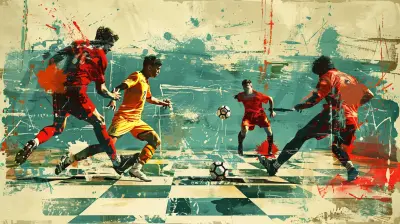An Inside Look at the Legal Consequences of Doping
18 January 2025
Doping. It’s a word that comes with a hefty load of controversy, scandal, and even some broken dreams. We’ve all seen headlines about athletes getting busted for doping, but what happens next? Beyond the damage to their reputation and career, athletes who engage in doping face a whole slew of legal consequences. And trust me, it’s not a slap on the wrist.
This article is going to dive deep into what happens when athletes get caught doping, the legal frameworks that govern these situations, and the broader impact on their careers and lives. Whether you're a sports enthusiast, an athlete, or someone curious about the law, this one's for you.

What Exactly Is Doping?
Before we jump into the legal stuff, let's make sure we’re all on the same page. What is doping, anyway? In simple terms, doping refers to the use of banned substances or methods to enhance athletic performance. This could be anything from steroids and blood doping to human growth hormones (HGH) and stimulants.Athletes do it to gain that extra edge, to run a little faster, jump a little higher, or swim a little quicker. But while it might give them a temporary boost, the long-term consequences can be devastating—both for their health and their legal standing.

The World Anti-Doping Agency (WADA): The Watchdog of Fair Play
When we talk about doping in sports, we can't ignore the World Anti-Doping Agency (WADA). This is the organization responsible for setting the global standards for drug testing and doping bans. WADA creates the list of prohibited substances and methods, and it’s their job to ensure that athletes compete on a level playing field.But WADA isn’t just about catching cheaters. They also have the authority to recommend sanctions and penalties for those who break the rules. And once you’re on their radar, it’s pretty hard to shake them off.

The Legal Consequences of Doping: It’s More Than Just a Ban
So, what happens legally when an athlete gets caught doping? The first thing that probably comes to mind is a ban from competitions, right? Sure, that’s a big part of it, but there’s so much more to it than sitting out a few games or races.1. Suspensions and Bans From Competitions
Let’s start with the obvious: bans and suspensions. When an athlete tests positive for a banned substance, they can be suspended from their sport for a certain period of time, often ranging from a few months to several years. In some cases, athletes can even be banned for life.It’s not just about sitting on the sidelines. A suspension or ban can strip athletes of their titles, medals, and even their earnings. You thought you’d won an Olympic gold medal? Well, if you’re caught doping, that medal might just be snatched right out of your hands.
2. Legal Fines and Financial Penalties
Suspensions and bans can be pretty brutal, but they’re often paired with hefty fines. Athletes who are caught doping may be required to pay significant sums of money, either as part of a settlement or imposed by governing bodies like WADA or national associations.And it doesn’t stop there. In some countries, doping is considered a criminal offense, which means athletes could be subject to criminal fines. These fines can be astronomical, especially for high-profile athletes who make big bucks.
3. Civil Lawsuits: Suing for Damages
Here’s where things can really get messy. If an athlete’s doping scandal has harmed others (think sponsors, teams, or even competitors who lost out on endorsement deals), they could face civil lawsuits seeking damages.Sponsors who signed multi-million dollar contracts with athletes based on their “clean” performance may come knocking on the door, asking for a refund—or worse, suing for damages. The same goes for teams or organizations that suffer financial loss because of the athlete’s actions.
4. Criminal Charges: Yes, You Can Go to Jail
In some countries, doping isn’t just a violation of sport rules—it’s a crime. Nations like Germany and Italy treat doping as a criminal offense, and athletes caught using banned substances could face criminal prosecution. Yep, you heard that right. Jail time.For instance, in Germany, the Anti-Doping Act (Gesetz zur Bekämpfung von Doping) allows for up to three years in prison for athletes caught using performance-enhancing drugs. In more severe cases, the penalties could be even harsher.
5. Loss of Endorsements and Sponsorships
It’s no secret that many athletes make a significant portion of their income through endorsements and sponsorships. But once an athlete is caught doping, those deals tend to evaporate faster than you can say “performance-enhancing drugs.”Companies don’t want to be associated with scandal, and doping is about as scandalous as it gets. Think back to athletes like Lance Armstrong. He lost millions in sponsorship deals after his doping scandal, and he’s not alone. Athletes who get caught doping often find themselves blacklisted by companies that once paid big money to have their faces plastered on billboards.
6. Reputational Damage: The Scarlet Letter of Sports
Even if an athlete manages to dodge criminal charges or hefty fines, their reputation may never recover. Doping scandals stick like glue, and in the age of social media, it’s nearly impossible to outrun them.The public’s opinion matters—a lot. Once an athlete is labeled a “cheater,” it’s a hard tag to shake off. Their legacy is tarnished, their achievements are questioned, and their future in the sport is often limited. In many cases, they might not even get a second chance.
7. Impact on Future Career Opportunities
Let’s say an athlete serves their ban and is ready to make a comeback. Sounds easy, right? Not so fast. Many athletes find it difficult to return to their sport after a doping ban. Teams might be reluctant to sign them, competitors may not trust them, and fans? Well, they can be pretty unforgiving.Even outside of the sport itself, finding new career opportunities can be tough. Think about it—who wants to hire someone who’s been involved in a doping scandal? Those doors that were once wide open might be slammed shut.

The Role of Anti-Doping Laws in Different Countries
It’s important to note that doping laws aren’t the same everywhere. Different countries have different approaches to tackling doping, and the consequences can vary depending on where the athlete is based.For example, in the United States, doping isn’t considered a criminal offense, although athletes can be hit with civil penalties, fines, and bans. However, in countries like Germany and Italy, athletes can face criminal charges, including jail time.
In Russia, the doping scandal that rocked the country’s athletic programs led to a major overhaul of anti-doping laws, but the country is still facing consequences on the global stage. Russian athletes have been banned from competing under their flag at several international events, including the Olympics.
In some countries, doping is so widespread that it’s almost become part of the culture. But make no mistake—whether or not criminal charges are involved, the legal consequences of doping are severe, and they can haunt athletes for the rest of their lives.
The Future of Anti-Doping: Stricter Laws and New Technologies
As science advances, so too do the methods of catching dopers. Anti-doping agencies are constantly evolving, employing new technologies and more stringent testing methods to ensure that athletes play fair. You can bet that the legal frameworks surrounding doping will only get tougher as time goes on.With advancements in detection methods, athletes who think they can get away with it might want to think twice. Furthermore, as more countries criminalize doping, the legal consequences will continue to grow.
Final Thoughts: Is It Really Worth It?
At the end of the day, doping might give athletes a short-term boost, but the long-term consequences are far from worth it. From suspensions and financial penalties to potential jail time and a shattered reputation, athletes who choose to dope put everything on the line.And for what? A moment of glory? A fleeting advantage? When you weigh it all up, it’s clear that the risks far outweigh the rewards.
So, the next time you hear about an athlete getting busted for doping, remember this: it’s not just about losing a medal or missing a game. The legal consequences can be life-changing—and not in a good way.
all images in this post were generated using AI tools
Category:
DopingAuthor:

Ruben McCloud
Discussion
rate this article
16 comments
Grayson Howard
This article effectively highlights the complex legal landscape surrounding doping in sports. It underscores the need for strict enforcement of anti-doping regulations while also addressing the ethical implications and the impact on athletes' careers and the integrity of competition.
April 1, 2025 at 6:29 PM

Ruben McCloud
Thank you for your insightful comment! I'm glad you found the article highlights the crucial balance between enforcement and ethics in doping regulations.
Zelda McClary
Doping in sports not only undermines fair competition but also carries significant legal ramifications. Athletes caught using performance-enhancing substances face suspensions, fines, and potential criminal charges. Understanding these legal consequences is essential for maintaining integrity in athletics and protecting the values of sportsmanship.
February 7, 2025 at 11:27 AM

Ruben McCloud
Thank you for your insightful comment! Highlighting the legal implications of doping is crucial for fostering integrity and fairness in sports.
Lucy Phelps
Doping: when athletes choose shortcuts over skill. Spoiler alert: the legal hangover isn’t worth the buzz!
January 29, 2025 at 11:20 AM

Ruben McCloud
Thank you for your insight! The allure of shortcuts can be tempting, but the long-term consequences of doping far outweigh any temporary gains.
Evren Erickson
Great insights on a critical topic! Understanding doping's legal repercussions is essential for safeguarding sports integrity. Thanks for shedding light on this important issue!
January 28, 2025 at 11:46 AM

Ruben McCloud
Thank you! I'm glad you found the insights valuable for protecting sports integrity.
Simon McGehee
Great article! It's vital to understand the serious implications of doping in sports.
January 27, 2025 at 5:36 AM

Ruben McCloud
Thank you! I appreciate your support and completely agree—understanding the implications is crucial for the integrity of sports.
Elias Gomez
This insightful article highlights the complex legal ramifications athletes face due to doping violations, emphasizing the impact on careers, reputations, and the integrity of sports. A must-read!
January 26, 2025 at 8:00 PM

Ruben McCloud
Thank you for your positive feedback! I'm glad you found the article insightful and relevant to the important issues surrounding doping in sports.
Falkor Nguyen
Doping violations can lead to severe penalties, including suspensions, fines, and damaged reputations for athletes.
January 26, 2025 at 4:53 AM

Ruben McCloud
Absolutely, the repercussions of doping extend far beyond immediate penalties, impacting athletes' careers and legacy profoundly.
Carmen Robinson
This article sheds light on the complex legal landscape surrounding doping in sports. It’s a stark reminder that athletes must navigate not only moral implications but also potential legal repercussions, impacting their careers and the integrity of the sport.
January 25, 2025 at 4:39 AM

Ruben McCloud
Thank you for your insightful comment! Indeed, the interplay between ethics and law is crucial in understanding the implications of doping in sports.
Martha McMillan
This article highlights the serious legal ramifications of doping in sports, emphasizing the need for stricter enforcement and awareness.
January 23, 2025 at 8:13 PM

Ruben McCloud
Thank you for your insightful comment! I agree that stricter enforcement and increased awareness are crucial in addressing the legal issues surrounding doping in sports.
Yazmin Gibson
The article provides a thorough exploration of the legal ramifications of doping in sports. It effectively highlights the complex interplay between athlete rights, health risks, and the integrity of competition. While penalties are necessary, the discussion also encourages a broader conversation about prevention and education in sports.
January 23, 2025 at 1:58 PM

Ruben McCloud
Thank you for your insightful comments! I'm glad you found the article effective in addressing the complexities of doping and its implications for athletes and the integrity of sports. Your emphasis on prevention and education is indeed vital for fostering a healthier sporting environment.
Harrison McDowell
This article provides a crucial examination of the legal ramifications surrounding doping in sports. It highlights how athletes can face severe penalties, including suspension and legal action, emphasizing the need for strict adherence to anti-doping regulations. A thought-provoking read for anyone invested in fair play and sports integrity.
January 23, 2025 at 3:55 AM

Ruben McCloud
Thank you for your insightful comment! I'm glad you found the article thought-provoking and relevant to the important issues of fair play and integrity in sports.
Corin Lee
Who knew that getting jacked could land you in legal trouble? Next time you’re tempted to ‘enhance’ your performance, remember: fines and bans are not part of the workout plan! Stick to protein shakes, folks—less risky and way more delicious!
January 22, 2025 at 12:43 PM

Ruben McCloud
Absolutely! It's a crucial reminder that the risks of doping far outweigh any temporary gains. Staying natural is not only safer but also promotes a healthier approach to fitness.
Alexa McAdams
This article effectively highlights the intricate legal landscape surrounding doping in sports. However, it would benefit from a deeper exploration of the ethical implications and the societal impact of these laws on athletes. Understanding both dimensions is crucial for fostering a fair sporting environment.
January 21, 2025 at 12:29 PM

Ruben McCloud
Thank you for your insightful feedback! I appreciate your suggestion and will consider expanding on the ethical implications and societal impacts in future discussions.
Jaxon Lane
Great insights on a complex issue! Understanding the legal ramifications really adds depth to the discussion of doping.
January 19, 2025 at 11:40 AM

Ruben McCloud
Thank you! I'm glad you found the insights helpful in understanding this complex topic.
Zephyrwind Jimenez
Great article! It's crucial to understand the legal ramifications of doping in sports. This insight not only highlights the seriousness of the issue but also underscores the importance of fair play. Keep up the fantastic work!
January 19, 2025 at 3:39 AM

Ruben McCloud
Thank you for your thoughtful comment! I appreciate your support and agree that understanding these legal ramifications is vital for ensuring fair play in sports.
Lila Jimenez
Integrity in sports hinges on robust anti-doping measures.
January 18, 2025 at 3:21 AM

Ruben McCloud
Absolutely, robust anti-doping measures are essential to maintain fairness and integrity in sports, ensuring that all athletes compete on a level playing field.
MORE POSTS

Why Every Athlete Should Add Yoga to Their Training Program

The Power of Team Bonding: Activities to Strengthen Connections

Yoga and Nutrition: A Holistic Approach to Wellness

Why Test Cricket Is Still the Ultimate Challenge

Rugby World Cup Moments That Shook the World

The Biggest Sports Celebrity Power Couples

Everything You Need to Know About Sports Watches

Dealing with Egos: Managing Star Players in a Team Setting

The Social Aspect of Virtual Sports: Forming Teams & Communities

How to Exploit a Numerical Advantage in Attack